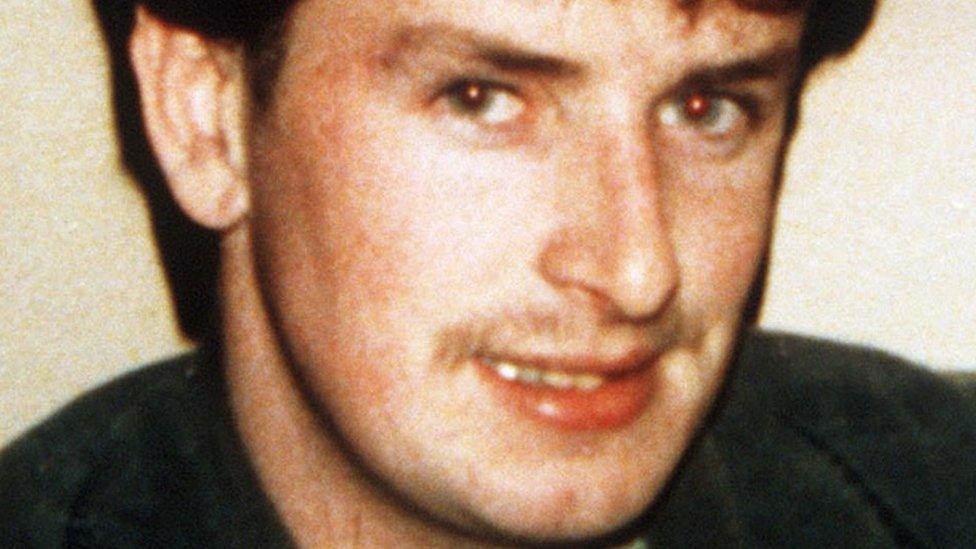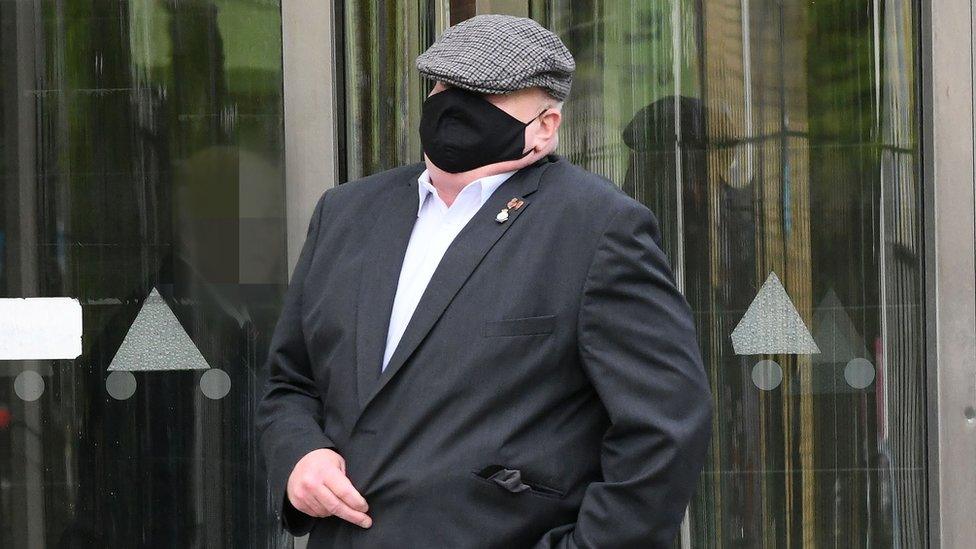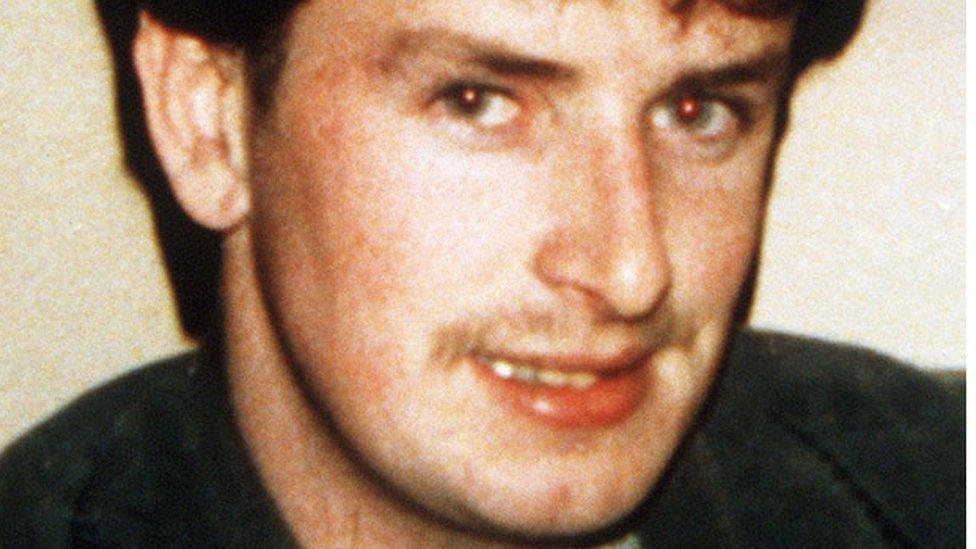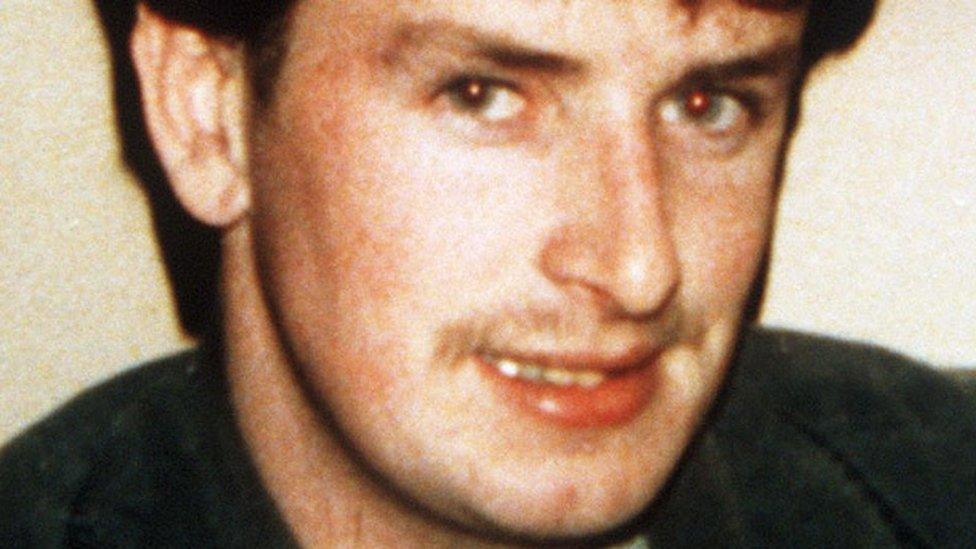Aidan McAnespie killing: Prison term for ex-soldier David Holden 'would be unjust'
- Published

Aidan McAnespie, 23, was hit in the back by a bullet as he walked to a Gaelic football match
A court has heard that it would be "unjust and unfair" to impose a custodial sentence on a former British soldier convicted of killing an unarmed man at a border checkpoint in County Tyrone in 1988.
Aidan McAnespie was walking to a Gaelic football match when he was hit in the back by a bullet that ricocheted off the road.
David Holden, 53, was found guilty of manslaughter in November.
He will be sentenced next week.
Holden is the first veteran to be convicted of a historical offence in NI since the 1998 Good Friday Agreement.
The judge previously said he considered the former Grenadier Guard to be "criminally culpable" beyond any reasonable doubt.
Wet hands claim dismissed
He found the defendant had pointed a machine gun at Mr McAnespie and pulled the trigger, while assuming the gun was not cocked.
"That assumption should not have been made," he said.
The judge had also concluded Holden's explanation as to how the weapon came to be fired was both entirely unconvincing and a deliberately false account.
He dismissed the defendant's claim his hands had been wet from cleaning duties.
Holden, who was 18 at the time, was on his first day of checkpoint duties with the Grenadier Guards.
Mr McAnespie was known to security forces as a "person of interest" - an IRA suspect.

David Holden, who was 18 at the time of the killing, denied aiming his weapon at Mr McAnespie
Defence counsel Frank O'Donoghue made a plea for a suspended sentence on Friday, arguing that it was "exceptional" for an 18-year-old to be charged and convicted of gross negligence manslaughter.
Military practice at the time had been to place lethal weapons in remote areas of Northern Ireland which were manned by young, inexperienced soldiers, he added.
While Holden had duties towards members of the public, the British Army had duties towards Holden, he added.
It "grossly failed to discharge those duties with the consequences that have occurred", he said.
But prosecution counsel Ciaran Murphy highlighted the profound loss suffered by the McAnespie family and the enormous risk taken by Holden when he was in no danger.
Speaking outside the court, Mr McAnespie's brother said his family had found Friday's proceedings difficult.
"We were thinking all through the case that Aidan was the victim, but today it seems that Mr Holden was the victim," said Sean McAnespie.
'Take no chances'
In November's written judgement, the judge said he was satisfied the defendant had not cocked the weapon himself before firing it.
But he said the defendant should not have assumed the weapon was not cocked.

Aidan McAnespie's brother Sean, seen wearing glasses, spoke of his family's relief at Holden's conviction in November
"This was the ultimate 'take no chances' situation because the risk of disaster was so great," he said.
"The defendant should have appreciated at the moment he pulled the trigger that if the gun was cocked deadly consequences might follow."
He said the defendant had broken two "golden rules":
Never aim a weapon unless one intends to fire
Never increase the risk of negligent discharge
Fined less than £400
Holden was initially charged with killing Mr McAnespie in September 1988.
At that time, staff from the director of public prosecutions met the senior RUC investigating detective and a forensic firearms expert and decided to withdraw the manslaughter charge.
In December 1988, Holden was charged by the Army under Section 69 of the Army Act 1955 with the offence of "prejudice to good order and military discipline'' and was fined £370.86 by his commanding officer.
The court heard that in 2008, the PSNI's Historical Enquiries Team (HET) reviewed the case and produced a report for Mr McAnespie's family.
Seven years later, Northern Ireland's attorney general invited the director of the Public Prosecution Service (PPS) to review the case in light of the HET report.
In January 2018, the PPS informed Holden a decision had been taken to prosecute him for manslaughter.
Related topics
- Published1 July 2022

- Published30 May 2022
